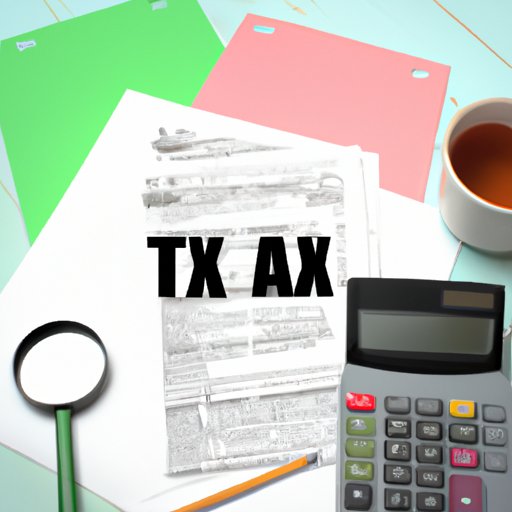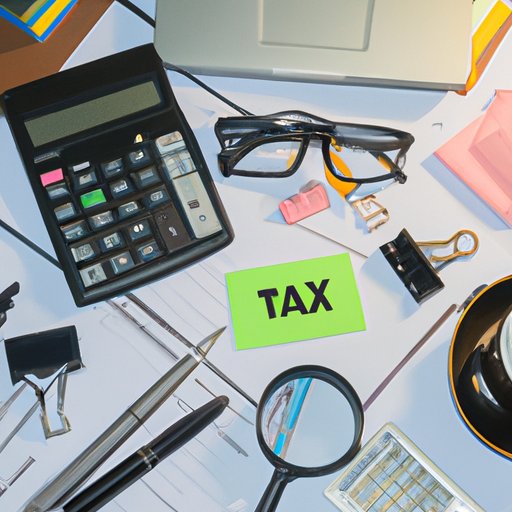Introduction
Tax season is an important time of year for many individuals and businesses alike. It’s also a great opportunity for entrepreneurs to start their own tax preparation business. Starting a tax preparation business can be a great way to become your own boss and make a steady income. However, it’s important to understand the process of starting such a business before taking the plunge.

Overview of the Tax Preparation Business
Tax preparation is the process of preparing tax returns for businesses and individuals. It involves collecting information about a person or business’s financial situation, calculating taxes owed, and filing the appropriate forms with the government. As a tax preparer, you’ll be responsible for ensuring that your clients’ taxes are accurate and up-to-date. You may also provide advice on how to save money on taxes and reduce tax liability.

Benefits of Starting Your Own Tax Preparation Business
Starting your own tax preparation business can offer many benefits, including:
- Flexibility: You have the flexibility to set your own hours and work as much or as little as you want.
- Income potential: According to the Bureau of Labor Statistics, tax preparers earned an average of $45,840 per year in 2019. There is potential to earn more if you gain experience and specialize in certain types of taxes.
- Helpful service: By offering tax preparation services, you’re providing a helpful and important service to your clients.
Outline the Necessary Steps to Start a Tax Preparation Business
Starting a tax preparation business requires careful planning and research. Here are the steps you need to take to get started:
Research Relevant Laws and Regulations
Before you begin operating a tax preparation business, it’s important to research the applicable laws and regulations. Every state has different laws governing the operation of tax preparation businesses, so it’s important to familiarize yourself with the rules in your state. Additionally, some states require tax preparers to obtain a license or certification before they can legally operate.
Create a Business Plan
Creating a business plan is an important step in starting any business. Your business plan should include the following elements:
- Mission statement: What is the purpose of your business?
- Market analysis: Who is your target market? How big is the market?
- Financial projections: What are your expected expenses and revenue?
- Operational strategy: What processes and procedures will you use to run your business?
Obtain Licensing and Certification
If required by your state, you will need to obtain licensing and certification before you can legally operate your business. The requirements vary by state, so it’s important to research the applicable laws. Additionally, you may want to consider obtaining voluntary certifications from organizations such as the National Association of Tax Professionals or the American Institute of Certified Public Accountants.
Identify Your Target Market
Once you’ve researched the relevant laws and created a business plan, it’s time to identify your target market. This will help you determine who you want to serve and how to best reach them.
Determine Who You Want to Serve
When deciding who you want to serve, it’s important to consider your experience and expertise. Do you want to specialize in individual tax returns or corporate tax returns? Are there any specific industries or types of businesses you want to focus on? Answering these questions will help you narrow down your target market.
Develop a Marketing Strategy
Once you’ve identified your target market, it’s time to develop a marketing strategy. You can use traditional methods such as print ads, radio spots, and direct mail, or you can explore digital marketing options such as pay-per-click advertising, social media campaigns, and email marketing. It’s important to find the right balance between traditional and digital marketing strategies to ensure your message reaches the right people.

Invest in the Right Tools and Technology
Having the right tools and technology is essential for running a successful tax preparation business. Here are some of the most important investments you should make:
Select Appropriate Software
Tax preparation software makes it easier to prepare accurate and up-to-date tax returns. There are many different software programs available, so it’s important to do your research and select the one that best suits your needs. According to a survey of tax professionals conducted by Intuit, “82% of respondents said that using tax preparation software saves them time and money.”
Invest in Office Equipment
You’ll also need to invest in office equipment such as computers, printers, scanners, and phones. Having the right equipment will make it easier to manage your business and provide excellent customer service.
Conclusion
Starting a tax preparation business can be a great way to become your own boss and make a steady income. To get started, you’ll need to research the relevant laws and regulations, create a business plan, obtain licensing and certification, identify your target market, and invest in the right tools and technology. With the right preparation and planning, you can be well on your way to a successful tax preparation business.
(Note: Is this article not meeting your expectations? Do you have knowledge or insights to share? Unlock new opportunities and expand your reach by joining our authors team. Click Registration to join us and share your expertise with our readers.)
